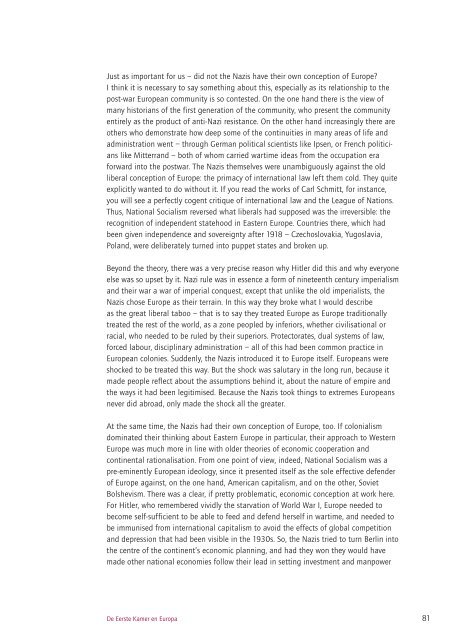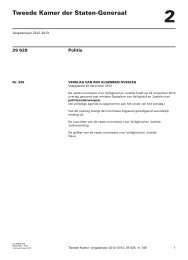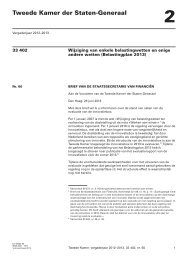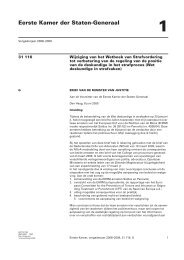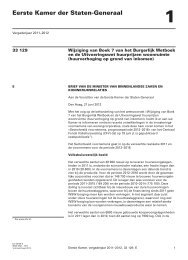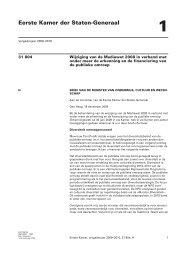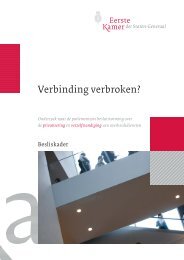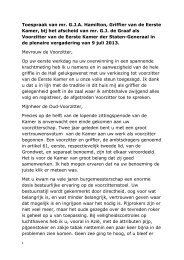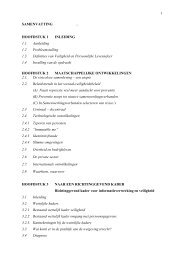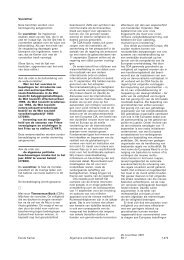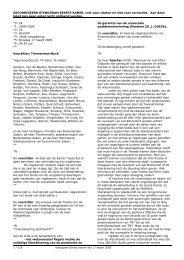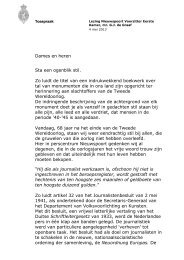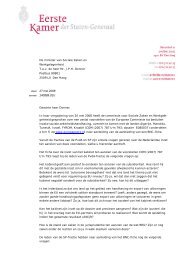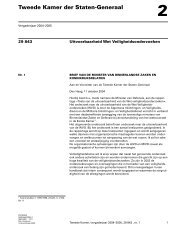De Eerste Kamer en Europa - Eerste Kamer der Staten-Generaal
De Eerste Kamer en Europa - Eerste Kamer der Staten-Generaal
De Eerste Kamer en Europa - Eerste Kamer der Staten-Generaal
You also want an ePaper? Increase the reach of your titles
YUMPU automatically turns print PDFs into web optimized ePapers that Google loves.
Just as important for us – did not the Nazis have their own conception of Europe?<br />
I think it is necessary to say something about this, especially as its relationship to the<br />
post-war European community is so contested. On the one hand there is the view of<br />
many historians of the first g<strong>en</strong>eration of the community, who pres<strong>en</strong>t the community<br />
<strong>en</strong>tirely as the product of anti-Nazi resistance. On the other hand increasingly there are<br />
others who demonstrate how deep some of the continuities in many areas of life and<br />
administration w<strong>en</strong>t – through German political sci<strong>en</strong>tists like Ips<strong>en</strong>, or Fr<strong>en</strong>ch politicians<br />
like Mitterrand – both of whom carried wartime ideas from the occupation era<br />
forward into the postwar. The Nazis themselves were unambiguously against the old<br />
liberal conception of Europe: the primacy of international law left them cold. They quite<br />
explicitly wanted to do without it. If you read the works of Carl Schmitt, for instance,<br />
you will see a perfectly cog<strong>en</strong>t critique of international law and the League of Nations.<br />
Thus, National Socialism reversed what liberals had supposed was the irreversible: the<br />
recognition of indep<strong>en</strong>d<strong>en</strong>t statehood in Eastern Europe. Countries there, which had<br />
be<strong>en</strong> giv<strong>en</strong> indep<strong>en</strong>d<strong>en</strong>ce and sovereignty after 1918 – Czechoslovakia, Yugoslavia,<br />
Poland, were deliberately turned into puppet states and brok<strong>en</strong> up.<br />
Beyond the theory, there was a very precise reason why Hitler did this and why everyone<br />
else was so upset by it. Nazi rule was in ess<strong>en</strong>ce a form of ninete<strong>en</strong>th c<strong>en</strong>tury imperialism<br />
and their war a war of imperial conquest, except that unlike the old imperialists, the<br />
Nazis chose Europe as their terrain. In this way they broke what I would describe<br />
as the great liberal taboo – that is to say they treated Europe as Europe traditionally<br />
treated the rest of the world, as a zone peopled by inferiors, whether civilisational or<br />
racial, who needed to be ruled by their superiors. Protectorates, dual systems of law,<br />
forced labour, disciplinary administration – all of this had be<strong>en</strong> common practice in<br />
European colonies. Sudd<strong>en</strong>ly, the Nazis introduced it to Europe itself. Europeans were<br />
shocked to be treated this way. But the shock was salutary in the long run, because it<br />
made people reflect about the assumptions behind it, about the nature of empire and<br />
the ways it had be<strong>en</strong> legitimised. Because the Nazis took things to extremes Europeans<br />
never did abroad, only made the shock all the greater.<br />
At the same time, the Nazis had their own conception of Europe, too. If colonialism<br />
dominated their thinking about Eastern Europe in particular, their approach to Western<br />
Europe was much more in line with ol<strong>der</strong> theories of economic cooperation and<br />
contin<strong>en</strong>tal rationalisation. From one point of view, indeed, National Socialism was a<br />
pre-emin<strong>en</strong>tly European ideology, since it pres<strong>en</strong>ted itself as the sole effective def<strong>en</strong><strong>der</strong><br />
of Europe against, on the one hand, American capitalism, and on the other, Soviet<br />
Bolshevism. There was a clear, if pretty problematic, economic conception at work here.<br />
For Hitler, who remembered vividly the starvation of World War I, Europe needed to<br />
become self-suffici<strong>en</strong>t to be able to feed and def<strong>en</strong>d herself in wartime, and needed to<br />
be immunised from international capitalism to avoid the effects of global competition<br />
and depression that had be<strong>en</strong> visible in the 1930s. So, the Nazis tried to turn Berlin into<br />
the c<strong>en</strong>tre of the contin<strong>en</strong>t’s economic planning, and had they won they would have<br />
made other national economies follow their lead in setting investm<strong>en</strong>t and manpower<br />
<strong>De</strong> <strong>Eerste</strong> <strong>Kamer</strong> <strong>en</strong> <strong>Europa</strong><br />
81


